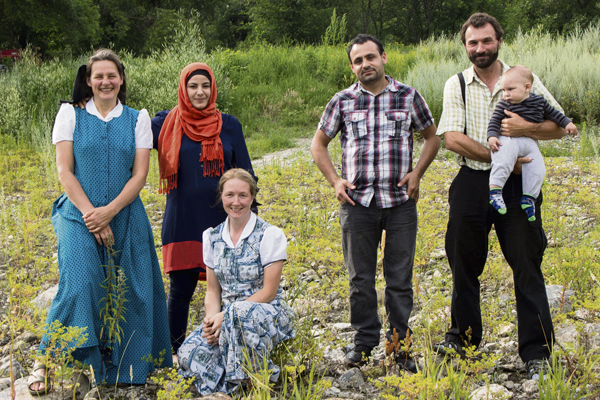A program that has helped to settle thousands of refugees in Canada, including some in Prince Albert, through private sponsorship celebrated its 40th anniversary Tuesday.
In 1979, the Mennonite Central Committee (MCC) became the first agency to sign an agreement with the Canadian government to allow for the private sponsorship of refugees. In the 40 years since more than 12,500 refugees have been resettled in Canada through MCC.
The agreement was sparked by c0ncern for hundreds of thousands of Vietnamese boat people fleeing Vietnam, and seeking refuge. MCC had programs in Vietnam starting in 1954, but the influx of people seeking refuge and resettlement called for a different response.
“For many Canadian Mennonites and Anabaptists, the refugee crisis felt close to home – many Mennonite families came to Canada themselves as refugees and recognized their opportunity to pay forward the kindness shown to them,” the MCC said in a press release.
Back in the 1920s, 21,000 Mennonites from the Soviet Union came to Canada. It was required that existing Mennonite communities cared for the newcomers. Many of those former refugees were the ones to step up in the late 70.
In the 18 months after the MCC signed that agreement in 1979, half of the 600 Mennonite and Brethren in Christ churches in Canada sponsored about 4,000 refugees. Following their agreement, other national church bodies signed other agreements with the Government of Canada.
When the refugee crisis in Syria hit again in 2015-16, the MCC again stepped up. Over a span of 12 months, the MCC, through private sponsorship, settled 1,500 refugees in Canada. It was the MCC’s largest increase in resettlement activity since 1979.
Mark Bigland-Pritchard is the MCCC Saskatchewan migration and resettlement coordinator. He works with groups and churches across the province to privately sponsor refugees coming to Canada.
“We work with church groups, with community groups, with really whoever can get themselves together to enable a private sponsorship of refugees,” he said.
“What that means is they raise enough money to support a refugee family for a year, or less than that if they become self-sufficient before then. But also to do the basic introduction into Canadian life.”
That introduction includes a cultural introduction, administrative tasks and things as simple as helping them learn the English language.
“That’s really, really important so that they can become economically self-sufficient,” Bigland-Pritchard said.
“These groups … do a lot of hard work in the community, building relationships, giving support and enabling these people to function in Canada.”
While MCC primarily works with Mennonite and Mennonite Brethren churches, they also work with the Orthodox cathedral in Regina and ethnic groups hoping to bring over more members of their family or community.
Bigland-Pritchard said he has worked with groups in Prince Albert, including a covenant church with a strong Congolese community and with one of the city’s Baptist churches.
‘We’ll work with anybody so long as they are willing to meet the standards of support for the people we want to bring in,” he said.
Last year, MCC Saskatchewan applied for 62 people and ended up bringing in 48. Bigland-Pritchard said that this year, they’ll be applying for about 80 people. Other provinces with higher populations and more sponsors, such as Ontario, bring in more.
The experience of sponsoring a refugee can be beneficial both for the refugees themselves and for the sponsor.
“People gain from sponsoring refugees,” he said.
“It’s a very emotional thing. When people get past that initial stage, it’s deeper, it becomes a matter of ‘these are our friends, these are our people that we want to spend time with, these are people we want to learn from.”
Looking back at the 40 years of sponsoring refugees to Canada, Bigland-Pritchard said the program has seen a lot of success.
“It’s very encouraging that it’s lasted. This is something Canada can be proud of,” he said.
“Canada was the pioneer. There were other countries that have started looking at it in the last few years, but it’s really well established here.
“And we’ve had groups doing really good work. We’ve been able to bring in a lot of people, we’ve been able to integrate them into a connecting community without losing their own cultural distinctiveness. It’s been, on the whole, extremely successful.”
Still, MCC knows that helping refugees is only one small part of the bigger picture.
“We also want to draw attention to the scale of the refugee crisis worldwide, and to the root causes of that,” Bigland-Pritchard explained.
“Why is there so much war? Why is there so much persecution? What’s the role of climate change in this? What’s the role of unequal economic systems in the countries producing refugees? We’re working without international staff. They’re involved in development … and maybe most importantly for this, peacebuilding in countries where there is conflict. Those things are really important to us as well because it means there aren’t as many refugees if we do that well.”
Bigland-Pritchard encouraged groups interested in sponsoring refugees to Canada to get in touch with him.
To Bigland-Pritchard, the continued success of the private sponsorship program is so important because it’s a way of helping some of the people who need it the most.
“It’s a way of expressing care for people who have the direst of need, and yet have so much to give and so much to offer,” he said.
“In a way, it’s a drop in the bucket. We’re helping a few people — but just being able to help a few people is good.”
To contact MCC Saskatchewan, call 306-665-2555 or email saskoffice@mccsk.ca


